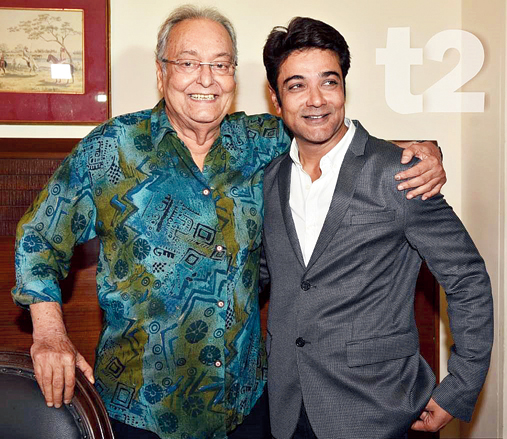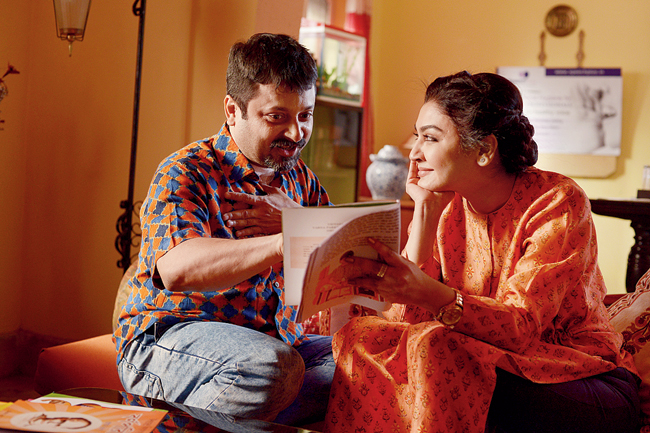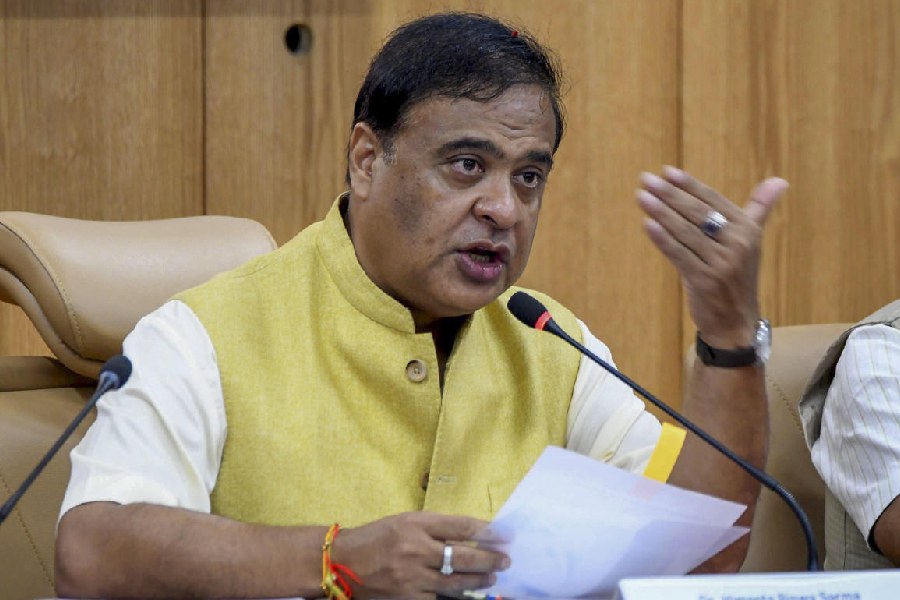After I got locked down like millions of my countrymen to avoid an unprecedented situation arising out of a deadly virus, I realised what I thought was everything was not everything after all! So, when I couldn’t rush to office first thing in the morning, plan a film’s schedule, seal the marketing deals, or promote a forthcoming release, I did the obvious — I slowed down. I guess that’s what life was asking me to do after years of round-the-clock work. So, what I did in return was start liking what life offered. I began watching the pending films on my bucket list, got hooked to the web, spoke to friends for a longer time, spied on my mother, shared inside jokes with my brother and a lot of laughter with my two sisters. I also learnt making perfectly round rotis that both Didi and my wife appreciate in the same vein as they would have if it were an innovative marketing strategy! The lockdown period also gave me the opportunity to look back at life and evaluate the last decade for all it has given me. Here are some of those...
Icche
In 2007, when Didi (Nandita Roy) and I were still doing television, we conceived our first film, Icche. We knocked on the doors of 50-odd producers; some even lived outside Calcutta. Problem was, everyone said they liked the story but in those days, remakes were a rage and no one would risk their money on an original film. Many said, the film wouldn’t work if ‘non-stars’ were cast as the mother and son. My friend, Rituparna Sengupta, suggested that I take the script to a top producer in Bengal. I had no other option. The producer heard the story and said if the mother and the son parted ways in the climax — they eventually did — the film would turn turkey at the box office. We decided to wait till we found another producer who would let us have our way. The film was finally made in 2008 and after crossing umpteen hurdles, released in 2011.
My takeaway: Follow your heart.
Hello Memsaheb
Jeet was already a superstar and readily agreed to work in an original film when we proposed one to him. The best part about my work in this film was that I was allowed to choreograph song sequences. I had earlier done that for television.
My takeaway: Chanelling creative energy in choreography.
Accident
This is the first time that I acted in our own directorial. As an actor, my debut was in Rituparno Ghosh’s Dahan and before Accident, I did films like In The Name Of A River, Bariwali and Jamai No. 1 — each exuded a different flavour. The directorial remuneration for this film was Rs 3.5 lakh. But our DoP, Anil Singh, wanted an Alexa camera, the first model that came out, to shoot the film. There was no separate budget for it and we ended up spending the entire amount on renting it. It was decided that we would take Rs 1 for the film. So, Didi and I took 50 paisa each.
My takeaway: Money comes later, cinema comes first.
Muktodhara
The day ahead of the shoot, we were told that we couldn’t film inside the correctional home. So, the schedule went for a toss and we started the film from the end. The film also saw my second performance as an actor under our direction; I was happy playing Happy Singh, a perfect foil to Nigel Akkara’s intense Yusuf Mohammad Khan. For the research, we would visit the correctional home often. Our phones used to be kept at the gate. There would be lots of missed calls and when I would tell people that I was inside the correctional home, while returning those calls, many would be silent for a while. That silence was one of shock and more of it!
My takeaway: Nothing can stop cinema.
Alik Sukh
On January 1, 2012, Dr Pronab Dasgupta (gynaecologist) did a C-section on a pregnant woman. With permission from the involved people, the child’s delivery was filmed. It was used in the opening sequence of Alik Sukh. I felt that was indeed unique. There’s another interesting story about this film. A big corporate production house was still operating back then. It had shown interest in funding this film but on one condition — the lead would have to be a big star. We promptly played down the offer and said Debshankar Halder was it for us! This film also marked our journey as producers. I understood that if we didn’t produce our films, we wouldn’t make them the way we wanted to.
My takeaway: Believe in what you do.
Ramdhanu
It was the happiest phase of my life as I could pig out on anything and everything and sleep like a log to get into the shoes of Laltu Dutta, a common man. Though I still find it tough to shed those extra kilos, there was immense satisfaction in playing the role that everyone loved. The sibling rivalry scene elicited guffaws in theatres and I still get the scene sent to me on WhatsApp all the time. The Laltu-Mitali jodi was lapped up by all and it’s this love that later made us do Haami and conceive its sequel, Haami 2.
My takeaway: There’s a hero in a common man.
Belaseshe
In 1993, I had joined Nandikar as a trainee. That marked my journey as an actor. Swatilekha Sengupta or Swatidi used to teach us Shakespeare’s texts. Years later, when the story of Belaseshe came up, it was my chance to offer my gurudakshina. I directed my teacher and it was a thrilling experience. Curiously, when she came on the floor, she told me, ‘I am very scared of you. Please don’t scold me during the shoot.’ So, the reverse became the obvious for me.
My takeaway: The teacher-student bond is sacrosanct.

Soumitra and Prosenjit The Telegraph
Praktan
Half the film industry wanted to bring back the celebrated pair of Rituparna Sengupta and Prosenjit Chatterjee in the 14 years that they didn’t work together. But Ritu had told me that if ever they were to come back, it would be with our directorial. So, Praktan was more of a gift from her side to us and not the other way round. When Prosenjit Chatterjee agreed to do the film, our lawyer had sent him an agreement that he was not keen on signing. At that point, I asked him why he was doing the film. He said it was for me. I asked him if he had full faith in me and he said yes. So, the next thing he did was sign the agreement without even taking a look at it.
My takeaway: Friendship and trust are priceless.
Posto
It was a difficult phase of learning for me. It was during the making of this film that Soumitrada’s (Chatterjee) grandson, Ronodeep Basu, met with a near-fatal accident and that shook us all up. But such a professional is Soumitrada that he never let his personal life come in the way of work. He would go about the shoot just like his other unit members and my biggest takeaway from seeing him do that was the understanding that actors didn’t have a personal life. Truth be told, every time a journalist friend wanted to interview him, I would be wary of its outcome. It was a dark chapter that also enlightened me in more ways than one.
My takeaway: The show must go on.
Haami
We were auditioning child actors for Konttho. So, when Brata Banerjee walked in, I had not even looked up. I read his name aloud and said, ‘Bratada kemon achho?’ His instant retort was, ‘Bolo Shibuda, ami keno ekhane achhi kichhui bujhte parchhina’. When I asked him if he would like to recite a poem (it could well be a nursery rhyme), he chose Shakti Chattopadhyay’s Abani Bari Achho. I must admit that I had not met such a talent before. Eventually, we put Konttho on hold and immediately started working on the script of Haami.
My takeaway: Small is big.
Konttho
That’s the best gift ever from Didi. I haven’t come across a character more challenging than radio jockey Arjun Mullick, who loses his voice to laryngeal cancer. I waited for 24 years to get a role like this and learnt to speak in an esophageal voice. Though I have been praised and praised for my performance, my mother refused to watch the film as she couldn’t see me in the role of a cancer survivor.
My takeaway: Patience is everything.
Gotro
It’s a story straight from my life. Long back, Nigel Akkara had sent a young boy to our Baranagar home as a caretaker. After a few days, he called me to say he was not fit for the job. When I asked why, he explained that my mother was teaching him Rabindranath Tagore’s texts and he couldn’t understand any. Didi eventually made Anasua Majumdar, who plays the protagonist in the film, Mukti Devi, pick up character nuances from my mother. With all this and more, I sometimes felt it was my mother who I was directing in this film!
My takeaway: Mom’s the world.
Belashuru
If Belaseshe is based on the institution of marriage, Belashuru is about looking for love in that institution. That is what I realised after my marriage with Zinia. In fact, the title was used in our wedding card and back then, the film was nowhere on the horizon. A copy of that card remains stuck to the back windshield of our car and I have had people in hordes asking me when the film was releasing when it was not even written. All thanks to that card, the buzz around the film was created in a small but significant way before we made Belashuru.
My takeaway: Love makes your world go round.










